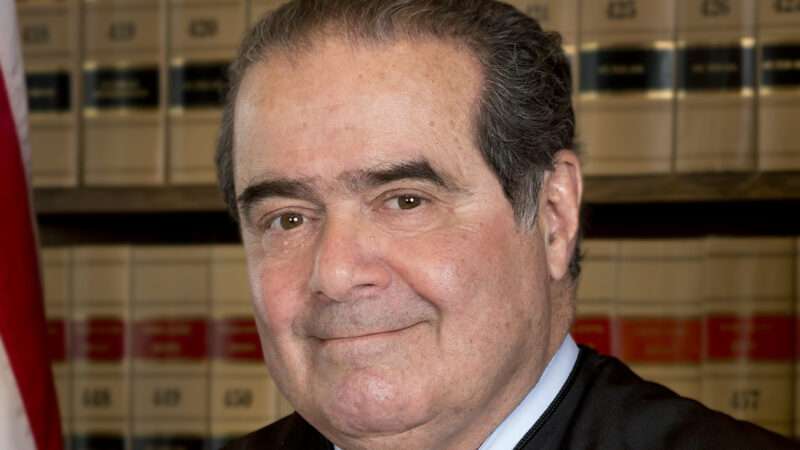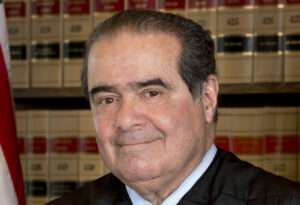

In my last post, I summarized what I learned from Justice John Paul Stevens' papers on Kelo v. City of New London, the controversial 5-4 decision in which the Supreme Court ruled that the condemnation of homes for "private economic development" is permissible under the Takings Clause of the Fifth Amendment, which only allows takings that are for a "public use." The papers were opened to the public earlier this week.
As noted in my previous post, one of the most interesting revelations in Stevens' files is that Justice Antonin Scalia wrote a dissent in the case, which he eventually chose not to publish. In this post, I reprint Scalia's dissent in its entirely (it's short!), and then offer some comments. Here's the dissent:
As JUSTICE O'CONNOR well explains, ante, at 1-2, 7-8 (dissenting opinion), the Court's decision today goes far beyond the holdings of our prior cases, and renders part of the Takings Clause a virtual nullity. Under the precedent set today, the Public Use requirement is effectively nonjusticiable. The political branches in the Federal Government and each State are left to administer it on the honor system.
It is hard to endure the Court's hymn of praise to "the best tradition of our federalist system," which permits "different communities" to use "political processes" to "strike the balance of costs and benefits in different ways." Ante, at 19. Why is it appropriate to sing that song in a case involving a real-live constitutional text clearly designed to constrain "political processes"; but to leave it unsung in the many cases involving phantom rights that the Court has summoned up from nowhere? The same Court that could fashion an enforceable constitutional entitlement out of every individual's "'right to define"' his or her '"own concept of existence, of meaning, of the universe, and of the mystery of human life,"' Lawrence v. Texas, 539 U.S. 558, 574 (2003) (quoting Planned Parenthood of Southeastern Pa. v. Casey, 505 U.S. 833, 851 (1992) (plurality opinion)), today proclaims that the deeply felt "limits of [its] authority," ante, at 19, preclude it from enforcing a right that has been in the text of the Bill of Rights for more than two hundred years. The Court erects citadels in ultima Thule while leaving the Vandals unattended in Rome itself. This foolish disparity should not go unnoticed, nor (in the long run) uncorrected.
I respectfully dissent.
The Stevens files show that Scalia circulated this dissent on June 15, 2005, eight days before the Kelo decision was issued. He then withdrew it on June 21, after Justice Stevens removed the passages in his majority opinion that most incensed Scalia. Most notably, Stevens cut the references to "the best tradition of our federalist system" and allowing "different communities" to use "political processes" to "strike the balance of costs and benefits in different ways."
For the most part, Justice Scalia's dissent echoes themes from Justice Sandra Day O'Connor's lead dissent, which he had already agreed to join. For example, both emphasize that the majority essentially gutted public use restrictions on takings.
The main distinctive point Scalia makes is the contrast between the majority's unwillingness to enforce an explicit enumerated constitutional right (the Public Use Clause of the Fifth Amendment) and its far greater solicitude for unenumerated "substantive due process" constitutional rights such as those enforced in Lawrence v. Texas (striking down laws banning same-sex sexual relations), and Planned Parenthood v. Casey (abortion). The latter was a longtime major concern of Scalia's (who forcefully dissented in both Lawrence and Casey).
It is interesting that Scalia withdrew the dissent after Stevens made changes to the wording of the majority. Although Stevens removed the specific phrases Scalia complained about, the substance of the opinion did not meaningfully change. It still treats the Public Use Clause much less favorably than various unenumerated rights. And it still cites federalism and diverse local needs as a justification for deferring to local authorities on public use issues:
Viewed as a whole, our jurisprudence has recognized that the needs of society have varied between different parts of the Nation, just as they have evolved over time in response to changed circumstances. Our earliest cases in particular embodied a strong theme of federalism, emphasizing the "great respect" that we owe to state legislatures and state courts in discerning local public needs.
Ironically, just 17 days before Kelo was issued, and nine days before Scalia circulated his dissent, the Supreme Court issued its decision in Gonzales v. Raich, which held that Congress' power to regulate interstate commerce was so broad that it allowed it to ban the possession of medical marijuana that had never crossed state lines or been sold in any market, even within a state. Justice Stevens was the author of the majority opinion in Raich, just like in Kelo. Raich was a deeply flawed ruling that expanded federal power further than any previous Supreme Court decisions, and ran roughshod over state diversity and autonomy. There is an obvious tension between Stevens' paeans to state and local autonomy in Kelo and his endorsement of extraordinarily broad federal power in Raich.
Scalia could and should have called out Stevens and the four other justices who were in the majority in both Raich and Kelo on this contradiction. But he was ill-positioned to do so, because he himself had also voted for the federal government in Raich, albeit in a concurring opinion that used different reasoning than the majority. In my view, this was one of Scalia's worst opinions.
In sum, Scalia was right to highlight the flaws in Stevens' appeal to federalism and local diversity. But his own role in the Raich case prevented him from pointing out the full extent of the contradiction in the majority's position.
There are two interesting unanswered questions surrounding Scalia's unpublished dissent. First, it is not clear why Scalia withdrew the dissent in response to what were largely rhetorical revisions to the majority opinion that failed to address his substantive concerns. Second, as noted in my last post, it is hard to explain why Scalia—the Court's leading champion of originalism—said virtually nothing about the original meaning of "public use" in his opinion, and chose not to join Justice Clarence Thomas' strong originalist dissent.
Despite withdrawing this dissent, Scalia still joined Justice O'Connor's forceful dissenting opinion. In later years, he continued to denounce the Kelo decision and predicted that it would one day be overruled (a prospect he welcomed). I hope he turns out to be the right on that last point.
The post Justice Scalia's Unpublished Dissent in Kelo v. City of New London appeared first on Reason.com.







